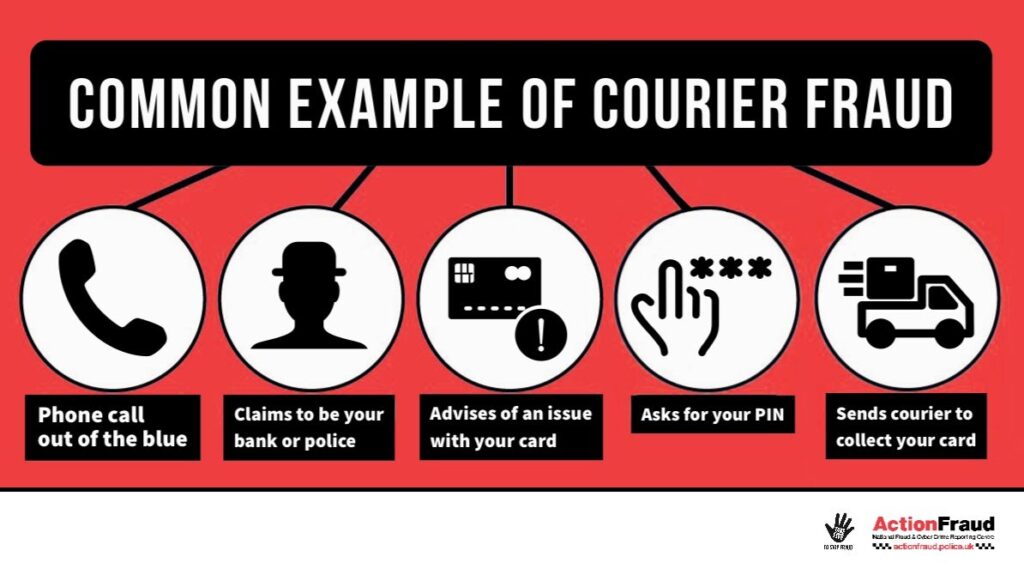Avoiding Courier Fraud
Wednesday, May 29th, 2024
Data released by Action Fraud puts losses to Courier Fraud in England and Wales at more than £28.7m in the 12 months to end-March 2024. The average loss per victim was £20,032. Beyond the significant financial losses, this is a crime type which can result in significant psychological harm, often to vulnerable victims.
Pensioners are urged to be especially vigilant, as people in their 80s account for 43% of all victims. Of reports made, 63% of victims were female and 37% were male.
What is Courier Fraud?

In a typical example of courier fraud, a fraudster may contact a potential victim by telephone, posing as a police officer or bank official. Their aim is to con the victim into revealing their PIN and credit or debit card details.
To begin with, the caller might be able to confirm some easily obtainable basic details about the victim such as their full name and address. The caller may also offer a telephone number for the victim to telephone, or ask the victim to call the number on the back of their bank card to check that they are genuine. In these circumstances, either the number offered will not be genuine or, where a genuine number is suggested, the fraudster will stay on the line and pass the victim to a different individual.
After establishing some trust, the fraudster will then, for example, suggest;
- Some money has been removed from a victim’s bank account and staff at their local bank branch are responsible.
- Fraudulent activity is suspected on the victim’s bank account.
- Suspects have already been arrested but the “police” need money for evidence.
- A business such as a jewellers or currency exchange is operating fraudulently and they require assistance to help secure evidence.
Victims are then asked to co-operate in an investigation by attending their bank and withdrawing money, withdrawing foreign currency from an exchange or purchasing an expensive item to hand over to a courier for examination who will also be a fraudster.
At the time of handover, unsuspecting victims are promised the money they’ve handed over or spent will be reimbursed but in reality there is no further contact and the money is never seen again.
Keeping safe from Courier Fraud
- Your bank or the police will never call you to ask you to verify your personal details or PIN by phone or offer to pick up your card by courier. Hang up if you get a call like this.
- If you need to call your bank back to check, wait five minutes; fraudsters may stay on the line after you hang up. Lack of a dial tone is a warning sign. Alternatively, use a different line altogether to call your bank. A call to 159 will put you through to your bank’s genuine customer service line.
- Your debit or credit card is yours – in no circumstances hand it over to a stranger. An offer to have somebody pick up the card for you to save you the trouble of having to go to your bank or local police station can only be fraudulent. You should only ever have to hand your card over at your bank. If it’s cancelled, you should destroy it yourself.
- We encourage family members, carers and friends to be vigilant on behalf of elderly residents. Installation of a call blocker can filter unwanted scam and nuisance calls to a landline.
Report Courier Fraud
Please report instances of Courier Fraud to Action Fraud on 0300 123 2040 or online.
If you have given your bank details over the phone or handed your card to a courier, call your bank straight away to cancel the card.
Other Recent Posts
Anyone can fall for an AI voice clone
Thursday, September 19th, 2024
Using voice cloning technology, scammers replicate voices, which can be used to dupe a person into sending money. James Nesbitt and Starling Bank have joined forces to promote the ‘Safe Phrases’ campaign. Watch the video. Read More...
Deepfake Videos – could you spot one?
Tuesday, August 13th, 2024
Understanding threats and taking appropriate actions, is by far the best approach to keep ourselves safer from frauds and scams. Nowhere is this more true than in the case of ‘deepfake’ videos. Read More...
Are you ‘oversharing’ on Social Media?
Tuesday, August 6th, 2024
Do your social media posts give away too much to potential fraudsters? A though provoking video, and a leaflet from getsafeonline.org providing tips and advice on guarding against oversharing online. Read More...
New Police and Crime Plan 2024-2029
Tuesday, August 6th, 2024
Thames Valley Police and Crime Commissioner Matthew Barber has published his Police and Crime Plan 2024-2029. This is grouped aroud three main themes – ‘Protecting Communities’, ‘Protecting People’ and ‘Protecting Property’. Read More...
Free webinar – Staying safe from scams, artificial intelligence (AI) fraud & cybercrime
Saturday, July 13th, 2024
Free webinar, for advice on how to spot a scam, how to report one and the ways you can protect yourself and others against them. Tuesday 16th July 2024 10:00am – 11:30am, via Microsoft Teams. Read More...
How we can help tackle industrial-scale Fly Tipping
Thursday, July 4th, 2024
Illegal waste activity is a massive cost to the economy and environment, often perpetrated by organised criminals. TVP, the Environment Agency and Buckinghamshire Council has had some significant successes recently. Read More...








